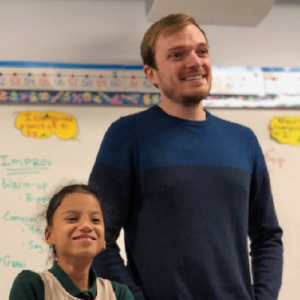
Improv Teacher Jack Novak: “Improv encourages expressiveness, something that society, over time, encourages us to repress”
So much of learning improv is relearning how to pretend and use your imagination like a kid. That’s why it only makes sense to start practicing improv at a young age, when you’re full of energy and imagination. Not only are improv classes a fun, natural fit for kids, but improv can also foster important communication and life skills everyone needs. At Marie Reed Elementary’s after school program in DC, WIT classes are taught by improv expert Jack Novak. We talked about his experience and what brought him to teaching improv to kids.

Tell us a bit about your background as an actor and teaching artist.
I studied theater, focusing on acting and playwriting, at Northwestern University. I’ve been working as a professional theater artist for over a decade. I’ve also been teaching theater arts in various forms since college. I’ve worked with both kids and adults, mainly teaching acting, mime, playwriting, creative drama, and, of course, improv.
When did you start improvising, and what made you want to teach it?
I started doing improv in elementary school at some point–when I was getting into theater classes and camps. In high school I started an improv club which I ran for several years before graduating. That was really my introduction to teaching improv, and I was definitely excited by the challenge. I continued to teach improv in college, leading free workshops for other students and eventually directing my college improv group.
What made you want to teach improv to kids? How do kids differ from adults in their approach to improv?
Teaching improv to kids always seemed like a natural thing to do. Kids have an inherent desire to play and pretend. Teaching kids is very similar to teaching adults, and each class is different. However, if I were to generalize, I would say the biggest challenge with adults is getting them to open up, get beyond their self-judgement, and follow their impulses, while the biggest challenge with kids is kind of the opposite–getting them to filter their impulses and make thoughtful choices based on what will most help the scene/ensemble.
Why do you think it’s important for kids to learn improv?
Improv encourages expressiveness, something that society, over time, encourages us to repress. Improv also fosters creativity, fun, listening and observation, empathy, and communication skills. These are extremely important traits in life for successful and happy humans.
What are some memorable moments from your time teaching young folks at Marie Reed and elsewhere with WIT?
There are lots of little moments. Usually they are the moments when students, both kids and adults, realize how fun and funny this can be. I especially love the moments when I see students appreciating someone else’s performance.
WIT’s after school program for kids is one of our many community outreach programs. Keep these programs going by donating and by attending Teen Spirit: A Prom-Themed Fundraising Bash on May 10.